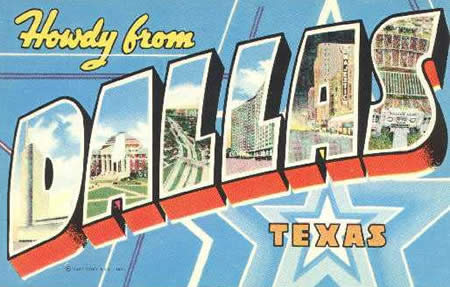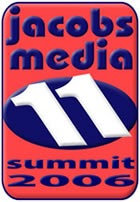
We had a great opening day at Jacobs Media’s Summit 11. Here’s a taste of today’s well-attended sessions…
 David Rehr, the new CEO of the NAB kicked off the day with "The Future of Radio" – and as hyped, it was a very cool look at the new guy and what he brings to broadcasting. David was forthright, direct, and energized about the issues radio faces, and what it’s going to take to reinvent the business. In short, he was about "going on the offensive" in order to combat misperceptions about radio. You can read Mike Boyle’s piece in the online edition of Radio & Records.
David Rehr, the new CEO of the NAB kicked off the day with "The Future of Radio" – and as hyped, it was a very cool look at the new guy and what he brings to broadcasting. David was forthright, direct, and energized about the issues radio faces, and what it’s going to take to reinvent the business. In short, he was about "going on the offensive" in order to combat misperceptions about radio. You can read Mike Boyle’s piece in the online edition of Radio & Records.
Dave Beasing ran a great session on CGM (Consumer Generated Marketing), featuring WCSX’s Jennifer Williams, WMMR’s Bill Weston, and KAZR’s Ryan Patrick. I’ve seen hundreds of panels where radio people get up and talk about things their station has done. Most of the time, these "show and tell" sessions fail to move the needle. But all three panelists showed promotions that blew people away. There was a ton of note taking during this session.
Gordon Borrell focused on "The Future of Online Revenue." With cold, hard data, he told the room that radio is simply missing the boat on online revenue, and that there is money out there – if radio intelligently and strategically goes after it. He was especially insistent on the need for dedicated online sellers, and had the data to back it up. This was another of those sessions were attendees were writing fast.
And the day ended on a highly stimulating note as Jason Calacanis took on "The Future of Media." This was a hard-hitting, honest presentation that had the room riveted. Jason – a veteran of Jacobs Media Summits – strongly suggested that radio reinvent and redefine itself with the sales teams, reach, and production expertise it has built over the years. He noted that after speaking at a podcasting convention recently, those were all elements that are missing from that online model.
Calacanis pointed to radio’s own listeners as a valuable resource when he noted, "The audience is your farm league." And while he contends that Steve Jobs wants to destroy radio – hence the lack of radio tuners in iPods – the fact that these devices have proliferated opens up some huge opportunities for radio. In response to the question of what, specifically, radio should do, he offered up the following steps:
1. Use salespeople to think creatively and get sponsorship dollars that are web content-related. Specifically, find out what clients want in podcasting and web programming, and give it to them.
2. Give everyone in the station an iPod, let them play with them, listen to them, and download content. From there, develop strategies for the development of podcasts that can be sold and marketed.
3. Go back to the DJs and programming people to find out what great ideas they’ve had over the years that can now be considered for niche web/podcasting programs. Because radio has had to think totally mass appeal over the past several decades, some great ideas have gone by the wayside. With podcasting, they can be dusted off, produced and developed.
4. Be authentic. This is why blogs have become so powerful, and why sites like MySpace have become mass appeal. As Jason says, "authenticity is the future of media."
As noted, it was a strong day, with high-content panels that flowed remarkably well from one to another. We’re looking for a great day tomorrow, as we continue "Summit 11 – 24 Hours to the Future."
- Media And Technology In 2025: Believe It Or Not! - April 18, 2025
- In Radio, You Just Never Know - April 17, 2025
- The Secret To Making A Great Podcast (And Great Radio) - April 16, 2025




Leave a Reply